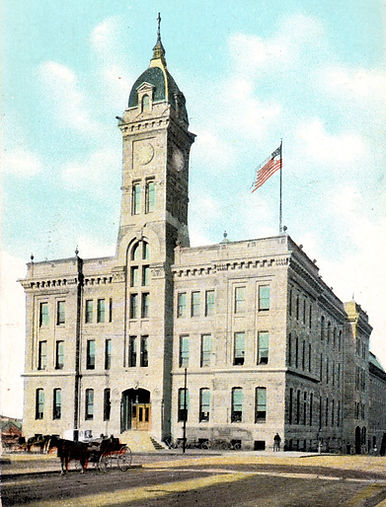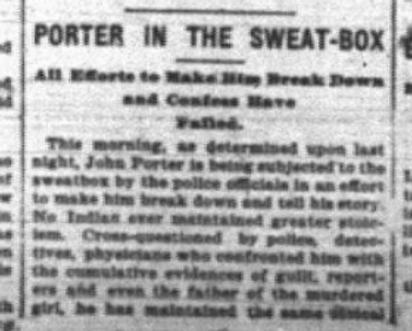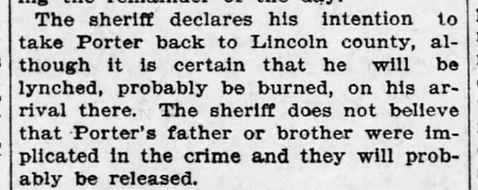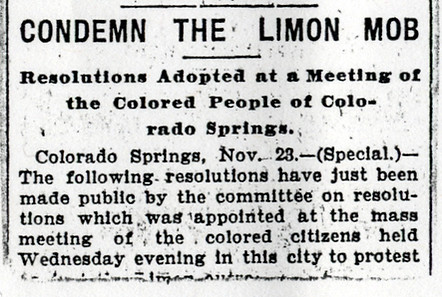On Friday, November 16, 1900, a large white mob lynched a fifteen-year-old African American teenager named Preston "John" Porter Jr., who was burned to death near Limon, Colorado in Lincoln County. Preston and his family were arrested while in Denver and interrogated about whether they were involved in the raping and murdering of a white farm girl named Louise Frost. Intense white racial hostility during this era burdened Black people with presumptions of guilt often leading to unfounded and unreliable accusations. Before Preston could have a fair trial, a white mob lynched him, denying his humanity and constitutional right to due process. Lynchings were lawless acts of terrorism that disregard true justice, as mobs, vigilantes and posses took the law into their own hands and killed victims accused of crimes, often by hanging or shooting, sometimes by beating, sometimes by burning.
PRESS COVERAGE
(Most excerpts are from the Denver Times, November, 1900 unless otherwise noted.)
November 16, 1900
Preston "John" Porter Jr. was 15 years old when he was lynched just outside Limon, in Lincoln County, Colorado.
The lynching made national news with reports in newspapers from Los Angeles to New York, and even in London, UK. Most of the accounts report Preston's age as being sixteen. When we started the remembrance project we accepted this as fact and in some of the materials on this site, such as the Denver City Council Proclamation, and during the Soil Collection Ceremony, you'll see that we describe him as being sixteen.
Recently, further research using census data from Kansas, shows that he was born in Ohio on April 25, 1885, which means that he was actually only 15 when he was lynched.
It's noteworthy that the press frequently tried to make Preston appear older than he was by describing him as being 'a man.'



We have pieced together the last days of Preston's life based mainly on accounts in the Denver Times, with some supplementation from Kansas newspapers where the story was widely reported, and the Los Angeles Herald, which posted a fairly detailed account. We're also aware that newspaper accounts are not always accurate so this description is an approximate one.
Preston and his father had the same name so during his lifetime Preston was known as "John", to avoid confusion. He and his father and brother came to Colorado in 1900, to work on railroad construction in the Limon area. His mother and the rest of the family remained in Kansas.
When Louise Frost, a white girl, who lived on her parent's farm a few miles outside of Limon, was murdered on November 8, 1900, the press immediately asserted that the murder must have been committed by a negro.

On November 11, 1900, Preston, his father and brother were in Denver. One reason they came was to cash a check for the work that they had done on the Union Pacific Railway. We know this for two reasons; first, Preston's last request was that he be allowed to sign a note authorizing his father to cash his Union Pacific check. Second, when his father was released from jail, a week after the lynching, he described to a reporter that he needed to go to the office of the Union Pacific Railway to cash the check.
While in Denver the three were stopped by the Denver city police, who questioned them about the murder of Louise Frost. The Porters denied being involved in any way with the crime but never the less they were arrested and held in the Denver jail, which was located in the Denver City Hall, at what is now 14th and Larimer St. in downtown Denver. Presently it is known as Bell Plaza.

They were interrogated and Preston was tortured by being placed in a sweatbox for four days. He was threatened that if he didn't confess his father and brother would be lynched. Preston was clearly the most vulnerable of the three because of his age and also because he had a brain injury from being hit in the head with a rock when he was five.
PORTER IN THE SWEAT-BOX
All Efforts to Make Him Break Down and Confess Have Failed
This morning, as determined upon last night, John Porter is being subjected to the sweatbox by the police officials in an effort to make him break down and tell his story.
No Indian ever maintained greater stoicism. Cross-questioned by police, detectives, physicians, who confronted him with this cumulative evidence of guilt, reporters and even the father of the murdered girl he has maintained the same...


On November 14, 1900, Preston confessed and when asked about the confession, on one occasion he said that he had confessed to save his father and brother.

"The negro had since his confession been devoting every moment of daylight to the perusal of a Bible given him by the Denver jailor."
- Los Angeles Herald, November 17, 1900
It became his constant companion and he can be seen reading it whilst on the train, with Sheriff Freeman, on his way to Hugo, the county seat of Lincoln County, where he was to be tried. The train passed through Limon on its way to Hugo. It's also noteworthy to see how small in stature Preston looks, sitting next to the sheriff.

After the confession newspapers both in Denver and Kansas reported that Preston would most likely be lynched.


The Topeka Daily Capital (Topeka, Kansas)-Tue, Nov 13,1900-
On November 15, 1900, a mob numbering in the thousands gathered outside Denver city hall and the jail. Governor Charles Thomas was informed but declined to interfere.
He was quoted by the Denver Times, (November 17, 1900) as saying,
"The spirit of lynch law is with the people" and "As a matter of fact hanging is too good for the man."

The mob dispersed without managing to enter city hall and Preston was secretly transferred to the Arapahoe County Jail that night, before being put on a train to Hugo the next day.

Preston "John" Porter Jr. was lynched on Friday, November 16,1900
The lynching of Preston Porter Jr. was committed by an angry, vengeful mob. It was a racial terror, spectacle lynching. Estimates of the size of the mob vary from 200 - 400 people and they came not only from Lincoln County but also from Denver and Colorado Springs. We know this because newspapers reported that the lynchers waited for trains to arrive from both cities.
Preston was killed with extreme cruelty and violence by being burned alive at the stake and the people there to watch reveled in the event. "The great crowd", said the Denver Times, "shook with pure enjoyment of the situation." And when, at one point in his extreme agony, Preston cried out: "Good Lord,....... forgive the people doing this. Good Lord, have mercy on Mr. Frost and the little girl." The crowd responded, "Yes,.... pray for the girl, damn you, and burn." "A yell of derision went up.......The incongruous incident of the murderer praying for his victim again aroused the humor of the crowd and they laughed as they cursed."
Reports describing the lynching as being carried out "coolly and deliberately" and the lynchers as "stolid executioners" are trying to downplay and legitimize what was in fact a horrendous crime that was being committed.

At Lake Station.
Three miles beyond Limon, at a small station called Lake, the train was flagged. When it stopped half a dozen men fell upon Sheriff Freeman, smothering him under their weight and taking away his revolver. One man from behind threw a rope over Porter's head, another grabbed him and pulled him from the seat. For the first time Porter showed signs of fear. He exclaimed: "For God's sake, don't take me." But that was all. He was whisked off the train and never whimpered again.
Must Be Burned.
When the halt was made one of the committee addressed the crowd and stated that it was the desire of the father of Louise Frost that her ravisher and murderer be burned. A thrill of horror ran through the crowd at this announcement and several protests were made. But a vote was taken and a large majority agreed to this.
A Small Crowd.
It was a very small crowd that accompanied Porter to the place of execution, but by the time of the lynching there were about 200 men and boys present. Some of these were from Denver, but most of them were residents of Limon and Hugo and ranchmen from the surrounding country. They came on horses, on foot, in wagons and on handcars. They were quiet, determined men, with a purpose...

The Los Angeles Herald, (November 17, 1900) when describing how Preston was taken by members of the vigilance committee, reports that,
"Their every act was marked by calmness and determination."
When Preston was seized a noose was placed around his neck and he was taken to the site where he would be lynched. He and the lynching committee arrived there some time after 3:45pm, when the train had arrived in Limon. The photo below shows Preston reading his Bible at the site of the lynching.

Porter gave away pages of his Bible as souvenirs.
This one he also signed.

Preston reading the Bible at the site of the lynching.
It was reportedly Louise Frost's father who decided that Preston should be burned to death and when they arrived at the site they immediately began their preparations for this.
The Los Angeles Herald, (November 17, 1900) gives the following description after the preparations had been completed,
"When at last preparations were completed, a further delay was made because it was known that many were en route from Hugo and other parts of the country to take part in the affair. It had been announced that 5:30 o'clock should be the hour for starting the fire, but it was nearly an hour later when the word was finally given. A strange feature of the affair was that of souvenirs. The negro had since his confession been devoting every moment of daylight to the perusal of a Bible given him by the Denver jailor. Even while waiting for his execution he sat by a bonfire reading from the gospel of St. Luke. Just before he was tied to the stake, upon request for souvenirs, the boy tore the leaves from the Bible and distributed them among his executioners."

A Bible seemed Porter's consolation. It was his companion from the time he confessed until his burned fingers no longer had strength to hold it.
From the time Preston was taken only men and boys were allowed to be present.
The Los Angeles Herald (November 17,1900) provides the following account of the start of the lynching,
"When everything was ready he walked to the stake with a firm step, pausing as he reached the circle of broken boards to kneel in prayer. He was allowed to take his time. He arose and placed his back to the iron stake and half a dozen men wound chains about his body and limbs."
After the fire was lit Preston screamed, and begged to be shot.
Los Angeles Herald again, (November 17, 1900)
"Suddenly the rope holding his hands burned through. Then the arms, head, and shoulders slipped through the chain. For an instant the body stood erect, the arms were raised in supplication, while burning pieces of cloth dropped from them. The body then fell away from the fire, the head lower than the feet, which were still fastened to the rail. For a few moments the stolid executioners were disconcerted. They feared that the only remaining chain would give away. If this had occurred, the partly burned human being would have been dashed among them with burning garments. Not many would have cared to capture him. But the chain held fast."

The Denver Times, (November 17, 1900) reported the following,


.png)
Pictured above is a burned fragment of one of the Bible pages that was given out by Preston as a souvenir just before he was lynched.
This page comes from the gospel of St. Luke, Chapter 23, about the crucifixion of Christ.
The backlash to Preston's lynching was immediate and it occurred both locally, nationally and even internationally.
Locally, in the evening edition of the Denver Times, on the day of the lynching, it was noted that
"the Denver authorities.... find themselves loaded with an exceedingly embarrassing responsibility"

The expressions recorded by the Denver Times included elected officials, religious leaders and the public at large. Many people were for the lynching but within that subsection a majority were not in favor of Preston being burned to death.


A common assertion was that the lynching only took place because at that time there was no death penalty in Colorado and the lynching fueled the call for this to be changed. Many elected officials and members of the clergy spoke out strongly against 'lynch law' as it was known.


One letter in particular printed in the Denver Times on November 17, 1900, referenced the impact that this kind of story has internationally.
The Governor also garnered attention by calling for members of the mob to be prosecuted.

A number of people blamed Sheriff Freeman:

Governor Charles S. Thomas also garnered attention by calling for members of the mob to be prosecuted, however, in the end no on was held accountable either for killing Preston, or for failing to protect him.
Asked to comment on the lynching, the governor said: "My opinion is that there is one less negro in the world." [Boulder Daily Camera, November 17, 1900]

However, it was also not forgotten that prior to the lynching, even when he knew that it was about to take place, he had refused to intervene.

The suggestion that Governor Thomas should have called out the militia to stop the lynching is interesting because in 1911, when a mob gathered to lynch an African American man, Bob Harris, Governor Shafroth threatened to call out the militia but didn't actually do so, and the rule of law prevailed. (Lynching in Colorado 1859-1919, Stephen J. Leonard)
On November 23, 1900, the Denver Times reported on resolutions that had been adopted by the 'colored people' of Colorado Springs.

Nationally the outrage continued and a noteworthy aspect was that the Northern States were particularly aggrieved that this lynching, by burning, had taken place in the North and not the South. It seemed that they were used to atrocities in the South but it was galling to have to accept that this type of horrendous violence could take place in the North as well.
The New York Times on November 18, 1900, condemned what they called the 'Limon Outrage'

The more far reaching condemnation however, came from the Chicago Tribune on November 20, 1900, it was also printed in the Denver Times. The headline read 'Censure Colorado'.
It started with the following paragraph:
"The burning of the negro Porter at the stake by the citizens of Limon, Colo., will be brought to the attention of President McKinley by the Methodist ministers of Chicago. At a meeting in the First Methodist church they passed a resolution censuring the governor of Colorado, the sheriff and citizens of Limon who composed the mob and resolved to request the president to call attention in his next message to the 2,000 persons put to death by mobs in the last ten years and urge him to recommend to congress suitable legislation that shall secure to every person accused of crime a fair trial and hold criminally liable all persons constituting mobs, to torture murder and burn."
This was followed by the resolutions contained in the article below.
"Censure Colorado"

122 years after Preston was lynched congress finally passed the Emmett Till Antilynching Act, which was signed into law by President Joe Biden on March 29th 2022.


